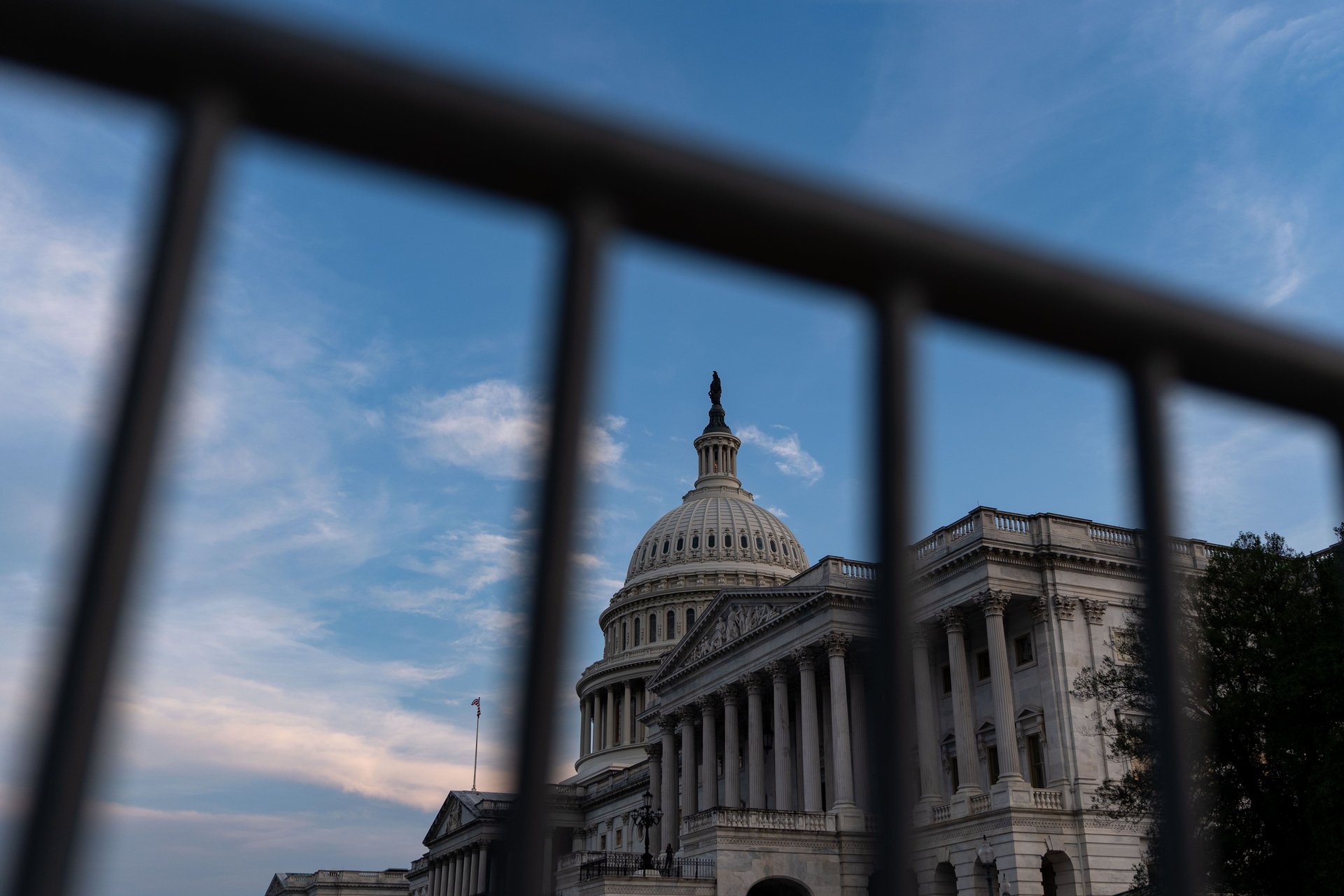Republicans are about to tax the money migrants send home. It could backfire
The provision in the GOP's megabill is seen as part of Trump's immigration crackdown. But it could eventually increase illegal migration to the U.S.

Kent Nishimura/Bloomberg via Getty Images
WASHINGTON — Republican lawmakers barreled ahead Thursday with a proposal to tax remittances in their sweeping domestic policy bill that will soon become law, a first-of-its-kind national measure seeking to restrain illegal immigration.
The proposal to tax funds that migrants send back to their home countries could punch a hole in economies across Central America, including one country led by a close ally of President Donald Trump. And it may even eventually increase the rate of illegal migration to the U.S.
The little-noticed provision in the bill that passed the House on Thursday would impose a 1% excise tax paid by all remittance senders, including U.S. citizens. Those using a cashier’s check, money order, and cash would be subject to the new tax. The remittance tax wouldn't be collected if it’s paid with a U.S.-issued credit or debit card. Digital transfers from bank accounts and other financial institutions would be exempted, along with cryptocurrency and stablecoins. Under the legislation now heading to Trump's desk, the tax would kick in next January and generate $10 billion in revenue over a decade.
Money transfer companies such as Western Union already charge fees varying from 5% to 10% on remittance payments sent to other countries. The tax would add to that cost and hit a vital artery of aid that reaches Central America, which receives a hefty amount of remittances from the U.S. every year. Experts say it’s too early to forecast specific effects on migration patterns.
But they warn it could actually increase the number of migrants who attempt to reach the U.S.
“If families are unable to cover those costs because those remittances are no longer flowing, they're going to have to find other ways of making a living,” said Helen Dempster, a London-based migration expert at the Center for Global Development. “That could include encouraging more migration in the long run.”
“If it does have an effect, it easily could go in the opposite direction of what [Republicans] are hoping for,” said Alan Viard, a senior fellow and economic expert at the right-leaning American Enterprise Institute.
The U.S. has long been the top remittance-sending country in the world, product of a resilient labor market with abundant employment opportunities. Migrants find jobs as construction workers, landscapers, or busboys and then send the money home. In 2022, a total of $79 billion flowed out of the country as remittances. That's about the same as the gross domestic product of Uzbekistan.
Republicans defend the measure as brake on illegal border crossings and a method to keep dollars parked in the U.S. The concept of taxing remittances has been coursing through the GOP bloodstream in recent years. In 2023, then-Sen. J.D. Vance of Ohio and Rep. Kevin Hern of Oklahoma sponsored a bill to impose a 10% remittance tax. Republicans view it as part of their broader immigration crackdown.
“There's a lot of abuse here,” said GOP Sen. Eric Schmitt of Missouri, who put forward legislation last month for a steeper 15% remittance tax. “I think there's two reasons you do it. One is a deterrent for illegal immigration, and one is a fairness argument. There's a lot of — I think — money that's actually not being taxed.”
The Inter-American Development Bank estimated in a November report that Central America received $46 billion in remittances last year, three-quarters of which originated from the U.S. Honduras relies on remittances to prop up 25% of its GDP. About 20% of Guatemala’s economy depends on it as well. For El Salvador, the figure is 24%. Remittances for all three countries reached record highs in May, per BBVA research.
Half of remittances to Central America are initiated with cash at a physical location, rather than electronically.

President Donald Trump with President Nayib Bukele of El Salvador at the White House in April. (Al Drago for The Washington Post via Getty Images)
Once the tax is in place, it could deal a blow to one of Trump's key geopolitical allies. El Salvador under President Nayib Bukele has positioned itself as a regional partner for the U.S. and aided the Trump administration’s aggressive deportations. Bukele set up a large prison to house U.S. detainees, including the wrongly deported Maryland resident Kilmar Abrego García. Hardline conservatives admire his authoritarian rule and popularity at home for dramatically reducing violent crime. Will Freeman, a Latin America expert, has dubbed it "the Cuba of the right."
That ideological bond hasn't been forged into an economic one. The remittance tax would pull $198 million in absolute terms from El Salvador's economy, according to an estimate from the Center for Global Development. That’s on top of other substantial foreign aid cuts leaving holes in El Salvador’s public budget and along with other poor nations. The Trump administration also has a universal 10% tariff extending to El Salvador.
"That ‘close relationship’ doesn't seem to have yielded much relief,” Dempster said.
$400 in Guatemala
Remittances flow through an economy to bolster consumer and business activity, which reduces poverty as a result. Ariel G. Ruiz Soto, a senior policy analyst at the Migration Policy Institute, cited the example of a Guatemalan man in Los Angeles sending $400 to a family member in the western Guatemalan city of Quetzaltenango, the average remittance sum. That migrant would be likely to pay the tax in this case because Guatemala’s banking services are limited compared to other countries in Latin America.
“What they usually do with those $400, especially in the rural areas, a fair share of that amount goes to daily expenses: food, education costs, backpacks for kids,” Ruiz Soto said, adding that it’s also been used to pay for electricity, water and medicine. A family with more financial leeway can employ the cash as capital towards building wealth and staying in place.
“You see a lot of homes that are being built by remittances that are being sent over,” Ruiz Soto said. “And these are houses that are made with bricks instead of wood, or that are three stories instead of one.”

A "remittance house" near more traditional homes in Salcaja, Guatemala. (John Moore/Getty Images)
Remittances from the U.S. aren't expected to dry up as a result of the tax. Indeed, cash flows to Latin America and the Caribbean plunged and rebounded during the pandemic in 2020. However, the ability of Central American governments to deal with external tremors are uneven.
In Mexico, the second-largest global recipient of remittances, the tax has stirred fierce criticism from President Claudia Sheinbaum who called it an “injustice.” Mexico received about $64 billion in remittances in 2023. Remittances to Mexico, though, dipped 4.6% in May in a possible knock-on effect of Trump's ongoing deportation campaign.
Sheinbaum announced plans on Monday to reimburse the Mexican immigrants in the U.S. who do pay it. However, poorer nations such as Guatemala lack the financial firepower to shore up their citizens' pocketbooks.
Now Guatemala's fortunes are becoming more intertwined with remittances. In 2024, $21.5 billion in remittances reached Guatemala, according to data from the Bank of Guatemala. The sum is double from 2019.
Over the finish
The remittance tax had whipped up opposition among payment-industry trade groups, which feared it would push people towards unregulated, underground channels and harm anti-money laundering efforts.
“A remittance tax is a double taxation that hurts everyday Americans and imposes a burden on common activities like sending money to a loved one abroad,” said Penny Lee, president and CEO of the Financial Technology Association. “While the Senate version of this proposal is an improvement, we believe a remittance tax is a flawed policy that will take us backward."
It also drew resistance from Stephen Moore, a former Trump aide who's now a senior fellow at the Heritage Foundation. In a letter to GOP senators last month, he called it a "punitive double tax" that would carry a "disastrous impact" on the U.S. economy.
Republican senators rewrote the tax and diminished its effect on cross-border payments after heavy lobbying. Compared to the House-passed version, the tax rate shrunk from 3.5% to 1% and specified that it would apply to cash transfers.
“What the Senate tried to do was go back to what we felt like was the House's intent on it,” said Republican Sen. James Lankford of Oklahoma, a member of the Senate Finance Committee. He later added: “I don’t think it worsens migrant outflow. It’s a pretty small tax.”
For Republicans, the tax is an unusual one to endorse, since it resembles government-imposed restrictions on cash flow they usually heap disdain on. "It is still a form of capital control and more so now that it applies to U.S. citizens as well," said Kyle Pomerleau, a tax expert at AEI.
Others want the U.S. to go even further. "Imagine how fast we could pay down the debt with a serious remittance tax," conservative activist Jack Posobiec said Wednesday on X.
